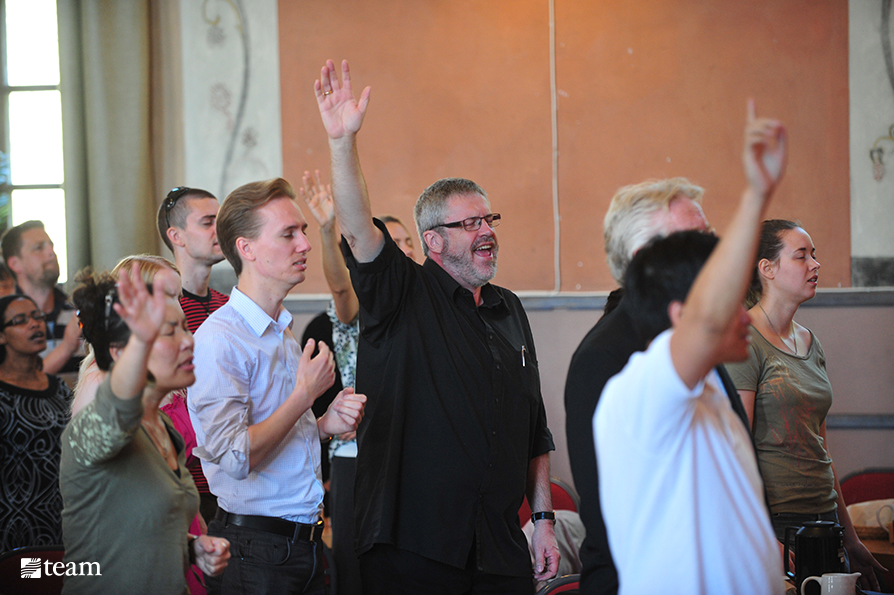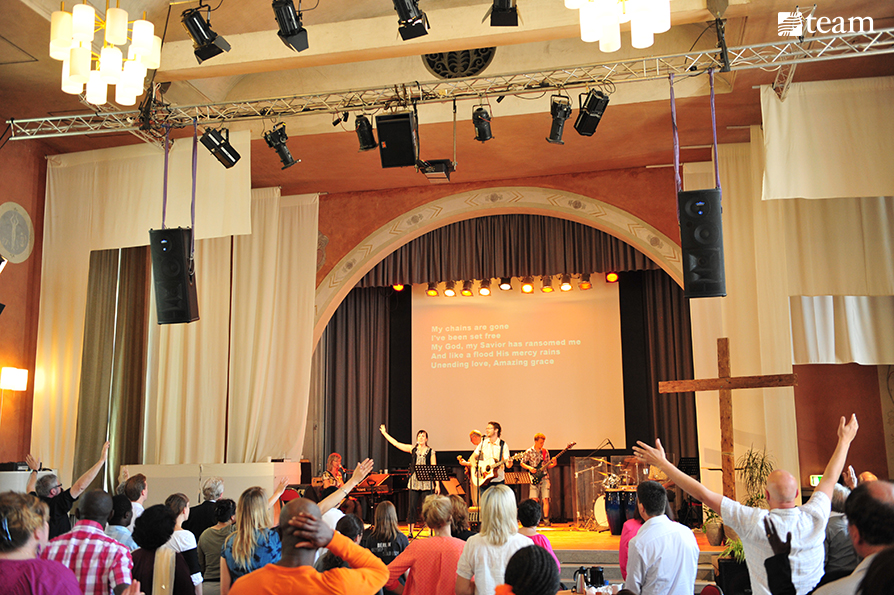
Becoming a Missionary, Missionary Life
International Churches: A Prelude to Heaven
November 22, 2022
by Suzanne Pearson

Imagine entering a place where people from many nations gather as one. The faces are a kaleidoscope of color. Multiple languages, cultures, and backgrounds find commonality in the Gospel.
This is the scene at international churches. Sounds like heaven, doesn’t it? Jeff Winters agrees. “There’s something so rich about having so many cultures in one place worshipping God,” says Jeff. “It’s a prelude to heaven when you go to an international church.” Jeff is a retired pastor who with his wife Judy served as an interim, or short-term, pastor at an international church in Turkey.
Jeff and Judy stepped in to fill that temporary but critical need in a unique way, and now their experience serves as a model for a new way that TEAM is partnering with international churches.
What is an International Church?
The term international church (or “IC”) is bit hard to define because it applies to churches that vary in size, style, and demographic makeup. Generally speaking, an International Church is one that predominantly consists of congregants who are “expats,” or people living in a country other than their own.
Sarah Reis is a TEAM Missions Coach who grew up attending international churches as her father served in foreign service in Israel, Korea, Panama, the Philippines, and Papua New Guinea. “When an international church comes to mind, you jump immediately to the typical expat church,” says Sarah. “So maybe military personnel, oil workers, or retirees – churches made up mostly of Americans, Canadians, Australians, British, New Zealanders.”
But the dynamic of international churches is changing, and these congregations now represent much more diversity. IC’s reach a wider scope of people groups living in a country that is not their own. “I would say the common thread of the international church now is people that are transitional or migratory, which is a growing population on the planet,” Sarah explains.
TEAM partners with many international churches around the world, predominately in Europe, Asia, and the Middle East. “They [each] look so different,” says Bruce Taylor, former Director of International Church Ministries for TEAM. Some international churches are quite large, with a significant staff and as many as 40 or 50 different cultural groups within the same congregation. Others are small with only a lead pastor and perhaps a few lay people to help with music or children’s programming.
Every Winning Team has a Deep “Bench”
As TEAM connects with international churches, we ask, “How can we serve you? What resources do you need in the work of ministry?” A common thread arose – the need for someone to step in when the pastor needs to take a leave of absence for a home assignment, sabbatical, or to tend to health or family matters. A similar need exists when an international church finds itself between pastors, needing someone to take on a transitional role until the hire of a long-term pastor.
Particularly for smaller international churches, there may be no one equipped to step in and lead the preaching and teaching in the pastor’s absence. As this need became evident, Bruce found an ally in David Fresch, Executive Director of the Missional International Church Network (MICN). As David and Bruce discussed addressing this need, they kept coming back to the idea of building a “bench.”
“If you think of a sport like hockey or football, you’ve got guys on the bench that you can just call in for part of the game,” explains Bruce. “Sometimes, you want a really specific skill set – to bring somebody in just for a piece of the game. That’s really what we want to put together.”
Andy Lee, TEAM’s new Director of International Church Ministries agrees. “Be ready and be alert,” Andy explains. “These are key attitudes for Christians. These are especially needed with international church opportunities. The bench will help TEAM, international churches, and candidates be ready to move into action.”
A New Partnership is Formed
From this idea, TEAM and MICN partnered together to develop an Interim/Transitional Pastors Program. The goal is to build a bench of experienced leaders who have a heart for missions and will consider a short-term assignment shepherding an international church on an interim or transitional basis. These folks might be retired pastors, retired missionaries, or others with pastoral ministry training or experience and the bandwidth to live overseas for a few months or even up to a year, depending on the need.

TEAM’s “bench” will allow international church pastors to take much needed breaks while also providing ministry opportunities for those with a heart to serve in short-term missions.
Jeff and Judy Winters Paved the Way
It all started years ago in Denver, Colorado. Patrick and Ruth (names changed) served as interns at a Denver church where Jeff was the pastor. The couple later served with TEAM at an international church in Antalya, Turkey, but their friendship with the Winters remained. So, when Patrick needed to take a 4-month sabbatical to work on his PhD, Jeff and Judy graciously stepped in to fill the gap. “I have wonderful memories of being [in Antalya],” Judy recalls fondly. She says it was a challenge at first to find ways to serve, but soon found her purpose working with women and children. “The more I was able to get involved, the happier I was to make friends and get to know the area.”
“The blessing for me was to be in a culture we’ve never been in before, a Muslim culture,” Jeff says. “To see [people] who were raised in the Muslim faith respond to the Gospel of Jesus Christ, to see them baptized and begin to serve Jesus – that was such a blessing for me.”
“Put Me In, Coach”
So how do people get on the bench? “It really isn’t a cookie cutter – it looks very different and diverse for whoever is involved,” says Bruce. “But we are actively recruiting people who have an interest in serving in this way. Anything from a month or two…to six months or a year, depending on the need.”
In today’s globalized context, North America is no longer the only place from which God is calling workers to serve in an interim role. “Most of our recruiting is North American but we are looking around the globe,” Bruce comments. “It needs to be global because the international church is global.” Bruce goes on to say that English is required for most international church posts, but he anticipates a growing need for languages like French and Spanish.
Another task is to help international churches become aware of the program, so that they know this is something that TEAM can help them with. “In my experience, international churches are always looking for qualified people and sometimes it’s just hard to find that right person,” Sarah shares. “The fact that we have this opportunity for churches is huge.”
Filling the Gap
Jeff and Judy are excited to see what God will do through the interim/transitional program. “I’m glad to hear that TEAM is building up a base of possible folks that can go out and do interim ministry,” Jeff shares. “The thought of having a pastor out there dealing with issues in their particular church and region, after a while, you need a break and to have somebody go in there and fill the gap for a time. Having that with TEAM will be a great benefit to pastors and smaller churches that [may otherwise] feel they are stuck. They can leave and feel confident that whoever comes in will be able to do the job.”
Sarah concurs. “This is such a huge way that TEAM can step up, partner with the Church, bless them, and equip them to train and disciple others.”

